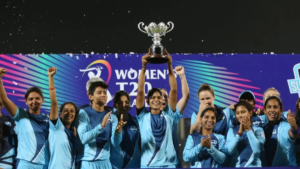Despite the fact that the conference amongst the three office-holders of the continental organisation was unable to reach a consensus on this matter, the Board of Control for Cricket in India (BCCI) would not support the hybrid model put out by its Pakistani counterparts for the upcoming Asia Cup 2023.
A final decision about the hosting of the 2023 Asia Cup will be made alongside the IPL championship, which is anticipated to draw a large number of prominent members of the Asian Cricket Council (ACC). This was said by BCCI Secretary Jay Shah. Chairman of the Bangladesh Cricket Board Nazmul Hassan was unable to attend the meeting owing to personal obligations, although representatives from the Sri Lankan and Afghan boards were present. During the conversations, there was no resolution reached.
BCCI denies claims of agreeing to PCB’s hybrid model for Asia Cup 2023: Sources
Read @ANI Story | https://t.co/a9JyU6Wz8R#BCCI #PCB #cricket #AsiaCup2023 #TeamIndia pic.twitter.com/37K6Otqcqq
— ANI Digital (@ani_digital) May 27, 2023
The IPL final between Gujarat Titans and Chennai Super Kings (CSK) was held in Ahmedabad, and the Indian Board had invited the leaders of all significant cricketing nations to attend. It is believed that Afghanistan and Sri Lanka supported the Indian board’s stance in opposition to the hybrid format, where the tournament will be played in two nations since India refuses to travel to Pakistan to play matches, and felt that the scheduling will be taxing on the players. A hybrid business model does not appeal to the broadcasters either.
Even though no decision was made, the Indian board will continue to consider a neutral location, and the Pakistan Cricket Board (PCB) will also be called for additional negotiations. Oman Cricket chairman and ACC vice-president Pankaj Khimji has reportedly been given the task of addressing the contentious matter. The ACC is presided over by Shah. The Indian Board is fine with playing in Sri Lanka even if PCB is the tournament’s hosts. However, BCCI believes that because to the extremely high temperatures in September, playing cricket in the UAE, which is PCB’s preferred neutral destination, won’t be possible.





